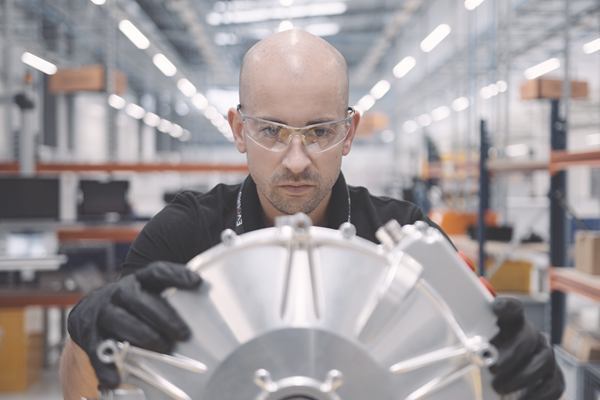Rethinking plastic sustainability: why a hybrid approach holds the key
Steven Sherman, CEO, BioLogiQ
In recent years, solutions to the plastic problem have centered around two dominant narratives: recycling and alternative materials. Yet despite considerable investment and public awareness campaigns, these strategies have failed to address the most urgent concerns tied to plastics – environmental pollution and the pervasive issue of microplastics.
A growing narrative alternatively argues that the future of sustainable plastics lies not in wholesale abandonment of conventional materials, but rather in a hybrid approach: incrementally introducing renewable, plant-based content into plastic products. This method represents a scalable, practical pathway that can significantly reduce environmental impacts without requiring radical shifts in production, infrastructure or consumer behaviour.
Meeting the limits of recycling with alternative materials
Recycling is often championed as the silver bullet for plastic waste. On paper, it should reduce the need for virgin plastics, cut resource consumption and prevent waste from entering natural ecosystems. However, real-world recycling systems are deeply flawed. Globally, only about 9 per cent of plastic produced gets recycled.
Moreover, recycling infrastructure varies greatly across regions, with many developing countries lacking the infrastructure for effective waste management, let alone recycling. Even in the best-case scenarios, recycling does not fully stop plastics from fragmenting into microplastics – tiny particles that infiltrate water, air and food supplies, posing long-term ecological and health risks.
Alternative materials such as paper-based substitutes have also gained traction. Yet they bring their own limitations from an environmental perspective. Paper, aluminium and glass have larger carbon footprints despite their recyclability, because of the large resources their original production requires. When this is considered in conjunction with performance limitations, plastic is often still the best material choice for efficiency and environmental impact.
A hybrid approach: gradual integration of renewable content
The hybrid approach proposes a pragmatic middle path. Instead of attempting to replace plastics entirely or rely solely on recycling, manufacturers can incrementally incorporate renewable, plant-based content with conventional plastics. This incremental strategy lowers the carbon footprint of plastics and introduces safer materials, while reducing microplastic potential. It also allows for the preservation of existing supply chains, manufacturing processes and product performance, while reducing reliance on fossil fuels and fossil-based polymers.
This approach has several advantages:
Scalability. Because hybrid plastics can be introduced gradually, they do not require immediate large-scale infrastructure changes. Existing plastic manufacturing and processing equipment can often accommodate blends with renewable content.
Environmental impact reduction. Even partial substitution of fossil-based polymers with renewable materials reduces carbon emissions and microplastic potential, supports circular economy principles and begins a system transformation toward safer materials.
Maintaining material performance. Hybrid plastics retain the strength, flexibility and durability of traditional plastics, ensuring product quality remains high. This is critical for applications such as packaging, electronics, and other use cases where performance cannot be sacrificed.
A pragmatic path forward
Hybrid plastic design aligns with the realities of global plastic production and consumption:
Industry adoption. Companies can pilot hybrid formulations in select products, gather data on performance and lifecycle impacts and scale production as confidence grows. This reduces risk and builds market acceptance over time.
Consumer acceptance. Hybrid design supports global consumer demand for more sustainable products and packaging.
Supply chain development. A hybrid approach creates market demand for renewable raw material, or feedstocks, encouraging investment in sustainable agriculture, biomass processing and logistics. This can stimulate rural economies and foster innovation in the use of biomass.
Ultimately, no single solution can solve the complex challenge of plastic pollution and its environmental consequences. Recycling, alternative materials and waste reduction efforts remain essential pieces of the puzzle. However, the hybrid approach offers a uniquely pragmatic and scalable strategy that leverages existing infrastructure and industry know-how while progressively improving the sustainability profile of plastics.
By incrementally replacing traditional plastic with renewable content, brands can de-fossilise and align with the circular economy. This realistic path to improvement follows the same model of technological advancement that has succeeded throughout history.
The bigger picture
Sustainability in plastics requires innovation not just in materials, but in how those materials are integrated into existing systems. The hybrid approach embodies this mindset by marrying innovation with continuity. It recognises the entrenched role plastics play in modern life – from food safety and medical devices to transportation and electronics – and seeks to evolve materials responsibly rather than discard them wholesale.
As policymakers, manufacturers and consumers collectively grapple with the plastic dilemma, embracing a hybrid approach provides a viable blueprint. It offers a way to meaningfully reduce the environmental harm of plastics while supporting economic stability and technological progress.
The future of sustainable plastics is not a binary choice between traditional polymers and radical alternatives, but a continuum where incremental change drives scalable impact. In this space, hybrid plastics are emerging as a promising solution – one that can turn the tide on plastic pollution and welcome in a cleaner tomorrow.
Join the movement to rethink plastic with smarter, scalable solutions

Business Reporter Team
Most Viewed
Winston House, 3rd Floor, Units 306-309, 2-4 Dollis Park, London, N3 1HF
23-29 Hendon Lane, London, N3 1RT
020 8349 4363
© 2025, Lyonsdown Limited. Business Reporter® is a registered trademark of Lyonsdown Ltd. VAT registration number: 830519543





